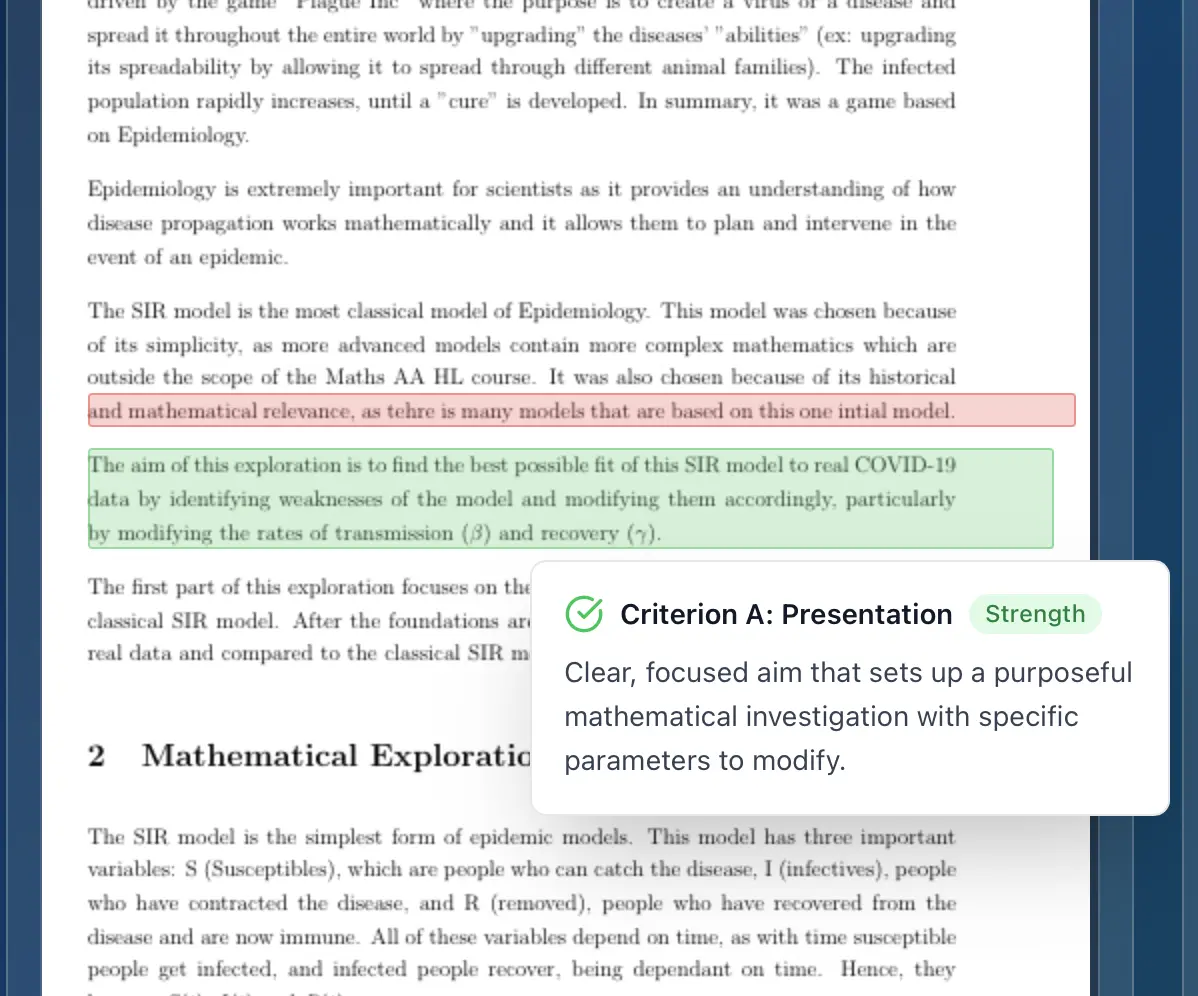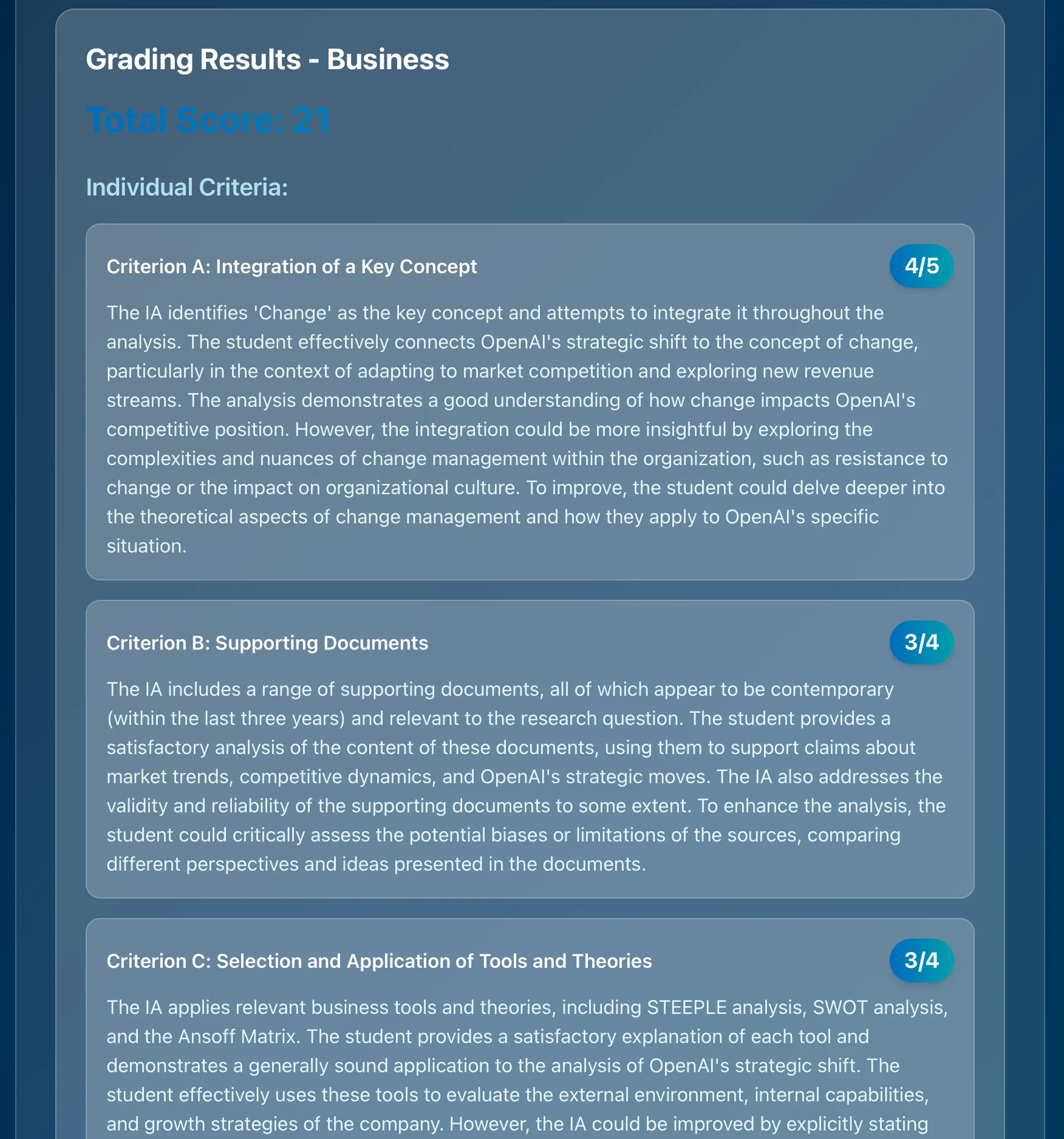Secrets to Scoring a 7 on Your IB Biology IA
Aiming for a top score on your IB Biology Internal Assessment (IA)? You're in the right place! This comprehensive guide will equip you with the knowledge and strategies needed to achieve a perfect 7. The IB Biology IA is a crucial component of your final grade, and understanding the assessment criteria is the first step to success. We'll break down each criterion, providing actionable tips and real-world examples to help you craft an outstanding IA. From designing a focused research question to analyzing your data effectively and drawing insightful conclusions, this guide covers it all. Let's dive in and unlock the secrets to IA success!
Understanding the IB Biology IA
The IB Biology IA is an individual investigation that allows you to explore a biological topic of your choice in depth. It's your opportunity to demonstrate your understanding of scientific methodology, data analysis, and critical thinking. The IA is internally assessed by your teacher and externally moderated by the IB, making it a significant factor in your overall IB Biology grade.
Struggling with IB Assessments?
Get instant, detailed feedback on your work with AI that understands IB criteria.

Core Content Sections
Choosing the Right Research Question
Your research question is the foundation of your entire IA. A well-defined research question is focused, measurable, and relevant to the IB Biology syllabus.
- Focus: The question should be specific enough to allow for a thorough investigation within the limited time and resources available.
- Measurable: You should be able to collect quantitative or qualitative data to answer the question.
- Relevant: The question should be connected to a biological concept or principle.
Example of a good research question: "How does varying the concentration of sucrose solution affect the rate of osmosis in potato cells?"
Example of a poor research question: "Is biology interesting?" (Too broad and subjective)
Mastering Criterion A: Research Design (6 Marks)
Criterion A assesses your understanding of research design principles. To score high in this section, you need to:
- Clearly state your research question: As mentioned above, ensure it's focused, measurable, and relevant.
- Explain the underlying theory: Provide a concise explanation of the biological concepts and principles related to your research question. This demonstrates your understanding of the scientific context.
- Select an appropriate methodology: Justify your choice of experimental design, materials, and procedures. Explain why your chosen method is suitable for answering your research question.
- Address safety, ethical, and environmental considerations: Identify any potential risks associated with your experiment and outline the safety precautions you will take. Discuss any ethical considerations related to your topic and address any potential environmental impacts.
Example: When investigating enzyme activity, mention the potential hazards of using certain chemicals and describe the appropriate safety measures (e.g., wearing gloves, using a fume hood).
Excelling in Criterion B: Data Analysis (6 Marks)
Criterion B focuses on your ability to collect, process, and interpret data accurately and appropriately.
- Collect sufficient data: Ensure you have enough data points to draw meaningful conclusions. Replicate your experiment multiple times to increase the reliability of your results.
- Process data accurately: Use appropriate statistical techniques to analyze your data. Calculate means, standard deviations, and perform statistical tests (e.g., t-tests, chi-square tests) where applicable.
- Present data effectively: Use tables, graphs, and figures to present your data clearly and concisely. Label all axes, provide units, and include descriptive captions.
- Consider uncertainties: Acknowledge and address uncertainties in your measurements. Calculate percentage errors and discuss their impact on your results.
Example: If measuring the rate of photosynthesis, calculate the standard deviation of your measurements to quantify the variability in your data.
Crafting a Strong Conclusion: Criterion C (6 Marks)
Your conclusion should be a clear and concise summary of your findings, directly addressing your research question.
- State your conclusion: Clearly state whether your results support or refute your hypothesis.
- Justify your conclusion with evidence: Refer to your data and analysis to support your claims. Explain how your results relate to the underlying biological principles.
- Compare your results to accepted scientific literature: Research and cite relevant studies or textbooks that support or contradict your findings. This demonstrates your understanding of the broader scientific context.
- Discuss uncertainties: Acknowledge any limitations in your data and discuss how they might have affected your conclusion.
Example: If your experiment showed a positive correlation between temperature and enzyme activity, cite research that explains the effect of temperature on enzyme kinetics.
Evaluating Your Investigation: Criterion D (6 Marks)
Criterion D assesses your ability to critically evaluate the strengths and weaknesses of your investigation.
- Discuss the strengths and weaknesses of your methodology: Identify any limitations in your experimental design, materials, or procedures.
- Explain the impact of methodological weaknesses: Discuss how these weaknesses might have affected your results and conclusions.
- Suggest realistic improvements: Propose specific and feasible improvements to your methodology that could address the identified weaknesses.
Example: If you had difficulty controlling a specific variable, suggest a more precise method for controlling it in future experiments.
Common Challenges/Mistakes Section
- Poorly defined research question: A vague or overly broad research question can lead to unfocused data collection and analysis.
- Solution: Refine your research question to be specific, measurable, and relevant.
- Insufficient data: Collecting too little data can lead to unreliable results and weak conclusions.
- Solution: Plan your experiment carefully and ensure you collect enough data points to draw meaningful conclusions.
- Inaccurate data analysis: Errors in data processing or statistical analysis can lead to incorrect conclusions.
- Solution: Double-check your calculations and use appropriate statistical techniques.
- Lack of critical evaluation: Failing to critically evaluate your methodology and results can limit your score in Criterion D.
- Solution: Spend time reflecting on the strengths and weaknesses of your investigation and propose realistic improvements.
- Plagiarism: Presenting someone else's work as your own is a serious academic offense.
- Solution: Properly cite all sources and ensure that your IA is your own original work.
Pro Tip: Get AI-Powered Grading
Stop second-guessing your grades. Get instant feedback aligned with official IB rubrics.

Advanced Tips/Strategies Section
- Consult with your teacher: Seek guidance from your teacher throughout the IA process. They can provide valuable feedback and help you stay on track.
- Start early: Don't wait until the last minute to start your IA. Give yourself plenty of time to plan, conduct your experiment, and write your report.
- Keep a detailed lab notebook: Record all your observations, measurements, and procedures in a lab notebook. This will be invaluable when writing your IA report.
- Use appropriate statistical software: Familiarize yourself with statistical software such as SPSS or R to analyze your data more efficiently.
- Proofread carefully: Before submitting your IA, proofread it carefully for any errors in grammar, spelling, or punctuation.
Technology and Modern Assessment Section
The landscape of education is constantly evolving, and technology plays an increasingly important role in assessment. AI-powered tools are transforming the way teachers provide feedback and students understand their strengths and weaknesses.
Marksy is a leading AI grading assistant specifically designed for the International Baccalaureate (IB). It helps teachers provide consistent, detailed feedback on IB assessments, including the Biology IA. Marksy uses official IB rubrics to ensure accuracy and fairness, providing criterion-by-criterion feedback and suggestions for improvement. This not only saves teachers valuable time but also helps students understand exactly how to improve their work and achieve higher scores. By leveraging AI, Marksy ensures that every student receives personalized and constructive feedback, empowering them to excel in their IB studies.
Conclusion with Clear Next Steps
Scoring a 7 on your IB Biology IA requires careful planning, meticulous execution, and critical analysis. By understanding the assessment criteria, avoiding common mistakes, and utilizing advanced strategies, you can significantly increase your chances of success. Remember to start early, consult with your teacher, and leverage available resources to support your investigation.
Next Steps:
- Review the IB Biology IA guide: Familiarize yourself with the official IB guidelines and assessment criteria.
- Brainstorm potential research questions: Choose a topic that interests you and is relevant to the IB Biology syllabus.
- Develop a detailed research plan: Outline your methodology, materials, and procedures.
- Start collecting data: Conduct your experiment and record your observations carefully.
- Analyze your data and draw conclusions: Use appropriate statistical techniques to analyze your data and interpret your results.
- Write your IA report: Follow the structure and guidelines provided in this guide to write a clear, concise, and well-supported report.
- Get feedback from your teacher: Ask your teacher to review your IA report and provide feedback.
- Revise and submit your IA: Incorporate the feedback you receive and submit your final IA report.
Ready to take your IB Biology IA to the next level? Try Marksy for free today and experience the power of AI-driven feedback! See how Marksy can help you understand the IB rubrics, identify areas for improvement, and ultimately, boost your score. For teachers, Marksy offers a streamlined grading workflow, saving you time and ensuring consistent, accurate feedback for every student.